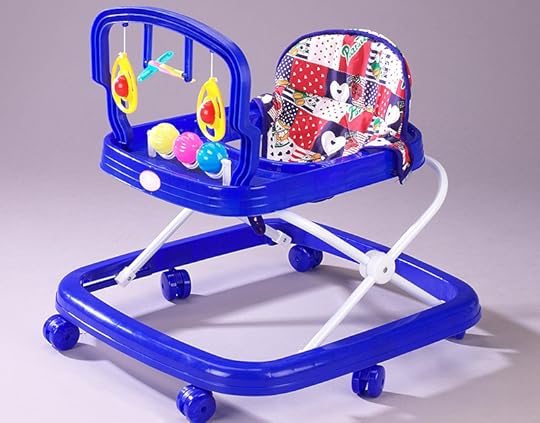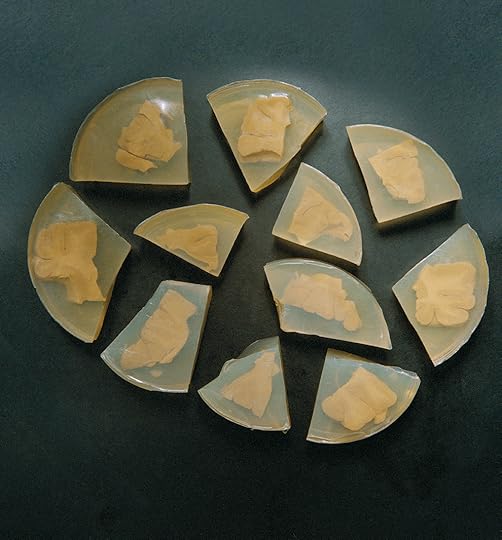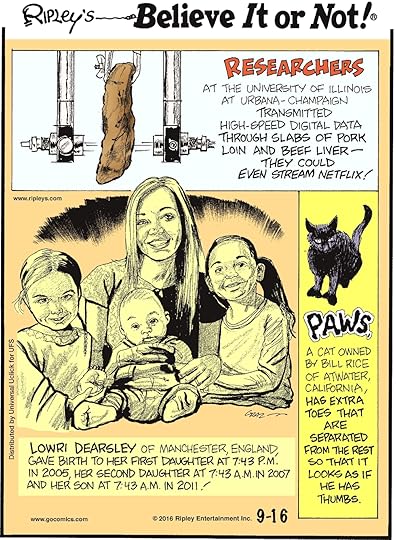Ripley Entertainment Inc.'s Blog, page 454
September 16, 2016
People are Drinking a Health Drink of Dried Cow and Goat Dung
Featured in Ripley's Believe It or Not!

Residents of Jinshicun village in China’s Hunan Province are drinking a mixture of cow and goat dung to fight cancer.
None of the hospital treatments for Ma Shuang’s lung cancer were working
She had a dream telling her to mix cow dung with goat droppings
She dried the mixture out, put it in hot water, and drank it
After that, she’s felt better, but she didn’t go back to the doctor
Seeing the “results,” the entire village started using the drink as a cure-all
MINI BION
“BIONs” – short for Believe It or Not – is the word we use at Ripley’s to refer to anything that is unbelievable and worthy to become part of Ripley’s lore and collection.
Source: People are Drinking a Health Drink of Dried Cow and Goat Dung
In Canada, You Can be Fined $100,000 for Selling Baby Walkers
Featured in Ripley's Believe It or Not!

Under the Canada Consumer Product Safety Act, Canadians are not allowed to manufacture, import, advertise or sell baby walkers.
The ban became law in 2004
Canada Health was concerned about the numerous injuries from baby walkers
Common injuries sustained with walkers include:
Falling down stairs
Flipping over
Reaching dangerous objects, such as household poisons or hot drinks
Crashing into heaters or hot stoves
As a result of the law, anyone selling used baby walkers can face fines up to $100,000 or six months in jail
MINI BION
“BIONs” – short for Believe It or Not – is the word we use at Ripley’s to refer to anything that is unbelievable and worthy to become part of Ripley’s lore and collection.
Source: In Canada, You Can be Fined $100,000 for Selling Baby Walkers
Thomas Sullivan Helped Invent Tea Bags By Accident
Featured in Ripley's Believe It or Not!

The tea bag was invented accidentally when New York merchant Thomas Sullivan sent out tea samples in silk bags and customers put them directly into teapots.
During the Tang Dynasty (618 – 907), tea was placed in folded paper to preserve its flavor
The first commercial tea bags were successfully marketed in 1904
Thomas Sullivan was a tea and coffee shop merchant in New York
He shipped tea bags around the world but intended the tea to be taken out of the bags before brewing
Customers found it easier to leave the tea in the porous bags
MINI BION
“BIONs” – short for Believe It or Not – is the word we use at Ripley’s to refer to anything that is unbelievable and worthy to become part of Ripley’s lore and collection.
The Cyclomer was the World’s First Amphibious Bike
Featured in Ripley's Believe It or Not!

The Cyclomer launched in Paris in 1932 was the world’s first amphibious bicycle.
The cyclomer had hollow wheels and floats
The bike didn’t work out because it didn’t get traction on land or in the water
Other amphibious bikes have since come up to take its place
MINI BION
“BIONs” – short for Believe It or Not – is the word we use at Ripley’s to refer to anything that is unbelievable and worthy to become part of Ripley’s lore and collection.
CARTOON 09-16-2016
September 15, 2016
At the Tianzi Hotel, You can Sleep in Someone’s Face
Featured in Ripley's Believe It or Not!

In China’s Hebei province, you can stay at the Tianzi Hotel which is shaped like three Chinese deities.
Tianzi loosely translates to Son of Heaven
The Tianzi Hotel was built sometime between 2000 and 2001
The three gods represent figures dating all the way back to the Ming Dynasty
The guy in blue is Shou, and he’s associated with longevity
The one is red is Fu, and he’s associated with fortune
The guy in green is Lu, and he’s associated with prosperity
The entire body of each is a hotel building, and the rooms go all the way up
MINI BION
“BIONs” – short for Believe It or Not – is the word we use at Ripley’s to refer to anything that is unbelievable and worthy to become part of Ripley’s lore and collection.
Source: At the Tianzi Hotel, You can Sleep in Someone’s Face
Mind Over Body – Dai Andrews
Featured in Ripley's Believe It or Not!

Starting with a Fisher-Price® magic set he received for his fifth birthday and progressing to mind-over-body feats, 38-year-old Dai Andrews has increased his skills beyond tricks and illusions, performing escape artistry, fire eating, and his personal favorite, sword swallowing.
When we first saw Dai Andrews, we knew he would be perfect for our new book, Unlock the Weird!
The goal of performing is to entertain, not necessarily to do weird stuff. You entertain through doing weird stuff, but ultimately, the goal has to be to entertain the audience.
His performances include swallowing a saber blade curved 120 degrees and even a sword heated with a blowtorch!

Dai Andrews – Sword Swallowing
Dai has traveled to over 40 countries around the world—studying yoga and traditional mind-over-body demonstrations with the sadhus and fakirs of India as well as martial arts in China and Thailand.

Making these feats even more impressive is that he struggles with essential tremors, a chronic, degenerative nerve condition that causes his hands to shake occasionally.
I have bested my own demons and applied the lessons of masters from around the world to my own life. And, if I’m lucky, I’ll pass that lesson on to my audiences as well, showing them that the only limits they have are the ones they set for themselves.
Source: Mind Over Body – Dai Andrews
CARTOON 09-15-2016
September 14, 2016
The Mystery of Albert Einstein’s Stolen Brain
Featured in Ripley's Believe It or Not!

When Albert Einstein passed away at Princeton Hospital on April 18, 1955, the pathologist on call, Dr. Thomas Harvey, did the unthinkable – He STOLE Einstein’s brain!
Embed from Getty Images
Einstein Worried About What Would Happen to His Brain
Albert Einstein knew his brain would be of interest to researchers. He left specific instructions regarding his remains:
Cremate them, and scatter the ashes secretly in order to discourage idolaters.
Besides Einstein’s brain, Dr. Harvey also removed the eyes and gave them to Einstein’s eye doctor, Henry Abrams.
Princeton Hospital did not look too kindly on Dr. Harvey’s harvesting of Einstein’s organs. Harvey attempted to explain himself:
I just knew we had permission to do an autopsy, and I assumed that we were going to study the brain.
Harvey’s explanation rings with untruth. Even if the hospital were granted research rights, that certainly would not apply to Dr. Harvey taking personal possession of the organs.
Hans Albert Einstein, the eldest son, granted Dr. Harvey permission to research the brain, but it was too late. After Dr. Harvey refused to surrender the organs, he was let go from the hospital.
Why Steal Einstein’s Brain?
Dr. Harvey wanted to see if Einstein’s brain could shed insight on the nature of genius. He sectioned over 200 pieces of the brain and sent them to neuropathologists. The remainder of the brain was placed in formalin-filled jars.
Though not a brain specialist himself, Harvey also conducted his own research on Einstein’s brain. When asked about his findings, he replied he was only a year away from publishing his research. He continued to give this answer for the next forty years – never publishing any findings.

Slices of Einstein’s Brain
The Aftermath
Things did not get better for Dr. Harvey. After his dismissal from Princeton Hospital, his wife left him and threatened to throw away what was left of the brain. Dr. Harvey retrieved the brain from his ex-wife and moved to Wichita, Kansas as a medical supervisor in a biological testing lab. He kept the brain in a box and stashed it under a beer cooler.
He later moved to Missouri and started practicing medicine, but after failing competency exams, he lost his medical license.
Moral of the story: Don’t steal organs that don’t belong to you.
What about Einstein’s Eyes?
Dr. Harvey had given Einstein’s eyes to Einstein’s optometrist, Dr. Henry Abrams. It is believed they are locked away in an NYC safety deposit box. Every once in awhile a rumor surfaces that the eyes are going up for auction, but Abrams insists he will never sell the eyes.
The Fate of Einstein’s Brain
One of the largest collections of Einstein’s brain, and one of only two places in the world to see Einstein’s brain, is at the Mütter Museum in Philadelphia.
The brain is sectioned into 20 slides.

Slides of Einstein’s brain. Via The Mütter Museum.
CARTOON 09-14-2016
Ripley Entertainment Inc.'s Blog
- Ripley Entertainment Inc.'s profile
- 52 followers






